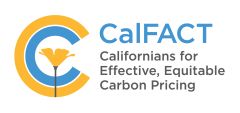Download as PDF
One Page Overview PDF
SB775 upgrades California’s cap and trade system to make it more effective at reaching our ambitious climate goals and more equitable for California residents and businesses.
Overview
- All GHG emitters will pay a predictable and steadily rising price on carbon emissions.
- All California residents will receive a quarterly dividend check that will protect them from price increases.
- SB775 funds investment to speed the transition to a clean energy future.
- A border adjustment will protect jobs in California by discouraging businesses from relocating to where they can emit more CO2, and motivate other countries to adopt similar carbon pricing policies.
- The predictable price protects businesses and consumers from sudden and unpredictable spikes, and helps them plan the investments needed to support their success during the clean energy transition.
- This bill addresses some environmental justice concerns by requiring all polluters to pay and motivating real emissions reductions in the hardest hit communities.
Steadily Rising Carbon Price
- SB775 is a hybrid between a cap and trade and a steadily rising carbon tax. An emissions cap is set and allowances are auctioned within a floor and ceiling price.
- The floor starts at $20 in 2021 and rises by $5/year to $60 in 2030, while the ceiling starts at $30 and rises by $10/year to $120 in 2030.
- The steadily rising floor and ceiling prices provide predictability while also offering some flexibility to allow prices to vary as our economy grows and changes.
- This also provides for better revenue predictability for funds that are invested in climate infrastructure and clean energy research.
Per Capita Climate Dividend
- Allocating most of the revenue to a quarterly dividend check to California residents will support and protect those who would otherwise be challenged by rising prices.
- Low-income households will benefit the most from their climate dividend checks as their carbon footprint and carbon costs are lower
- The dividend provides for ongoing support from voters which is critical as the price rises.
- Modeling studies commissioned by Citizens’ Climate Lobby show that dividends can boost the economy and create jobs.
Investment in a clean energy future
- A small portion of the revenue will be invested in two funds — California Climate Infrastructure Fund and the California Climate and Clean Energy Research Fund.
Border Adjustment
- The border adjustment will protect jobs and businesses by creating a level playing field through an equivalent carbon price on carbon intensive products coming into the state and a matching rebate for such goods that are exported.
- The border adjustment protects California’s economy and California jobs, while at the same time it acts as a major incentive to other economies to set meaningful prices on carbon in their own states or nations.
- This border adjustment provides a model for other national and sub-national legislation in the U.S. and around the world.
Environmental Justice
- SB775 removes the ability to use carbon offsets that are questionable in terms of reducing greenhouse gas emissions and resulted in no change or worsening of air quality in California.
- SB775 would no longer allow carbon offsets and free allowances, which permitted facilities to comply with the program at little cost without actually reducing the pollution at their facilities.
- CalFACT aligns with the California Environmental Justice Alliance’s (CEJA) promotion of tying this bill to AB378 in order to clearly address air quality issues and the need for limiting rising emissions from large industrial polluters.
- The dividend provides for broad reach to all Californians, including homeless, unbanked, under banked, and undocumented.
California leadership in fighting climate change
- The simplicity of this approach supports easier replication by states or other countries. This is especially helpful for national and sub-national bodies with limited infrastructure who face challenges in managing more complex carbon pricing mechanisms.
Who has shown general support for this bill? (Some may have reservations on some aspects or want clarification on some elements and want this bill more clearly linked to intent of AB378).
- Asian Pacific Environmental Network (APEN)
- California Environmental Justice Alliance (CEJA)
- Californians for a Carbon Tax (CalFACT)
- Center on Race, Poverty & the Environment (CRPE)
- Citizens’ Climate Lobby
- Coalition for Clean Air
- Friends of the Earth
- Greenlining Institute
- Legislative Council for Justice and Accountability
- Public Advocates
- SCOPE (Los Angeles)
- Union of Concerned Scientists
- Sierra Club Calfornia (support in concept)
